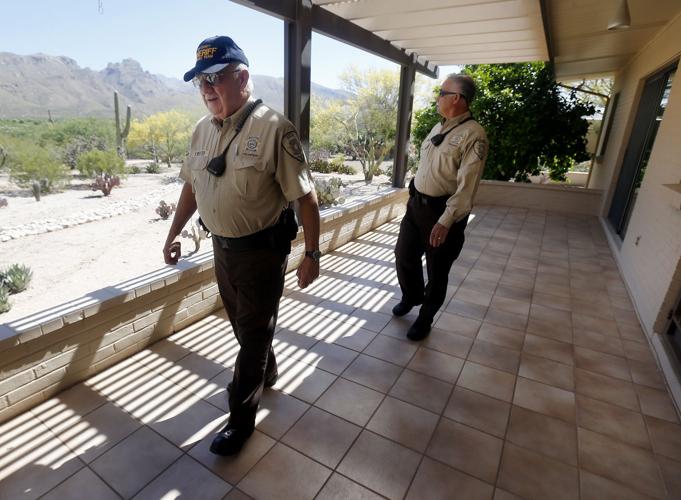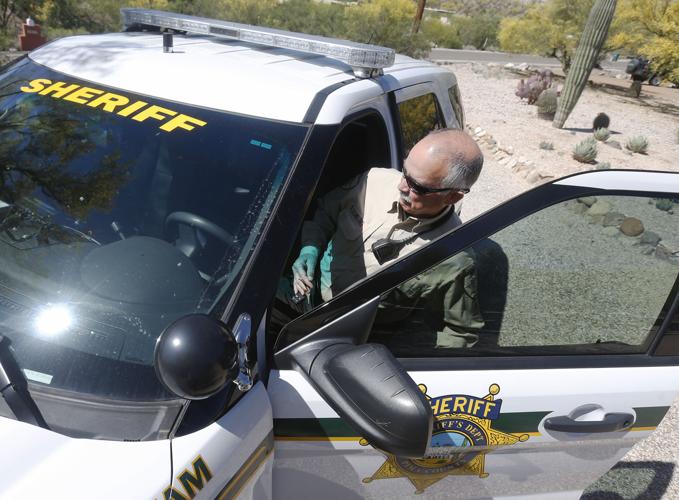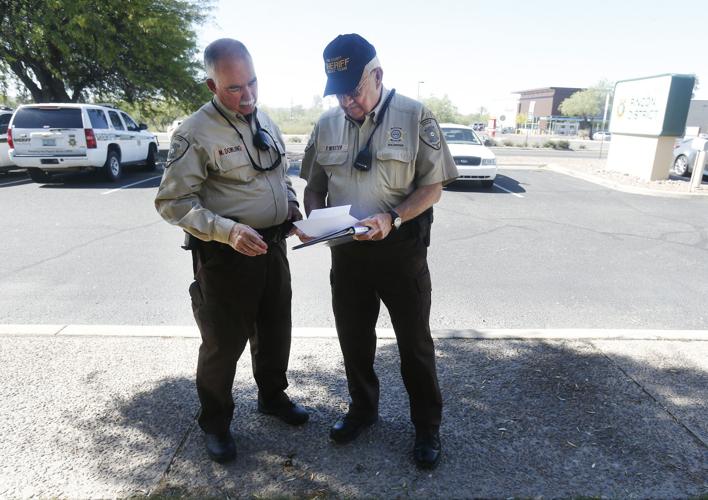A volunteer deputy’s shooting of an unarmed man in Tulsa, Oklahoma, last month has sparked national conversations about what kind of authority a volunteer in law enforcement should have.
That 73-year-old volunteer deputy, Robert Bates, is a retired insurance executive who is said to have financial ties to the local sheriff. He was participating in an undercover drug sting at the time of the shooting, reports say.
In the Tucson area, law enforcement agencies all have volunteer programs, but not all have reserve programs in which participants are sworn police officers with the same training as full-time officers.
Civilian volunteers help with clerical functions, fingerprinting, traffic control, special events, crime prevention and neighborhood watch, among other things. They do not have any enforcement capabilities, with the exception of Tucson police volunteers, who can enforce parking violations.
None of the Tucson area agencies arm their civilian volunteers or allow them to participate in potentially dangerous investigations. Their main duty is to be an extra set of eyes and ears for the deputies and officers.
- The Tucson Police Department has a volunteer team called “Police Assist Group,” which is comprised of five volunteers. It also has a reserve program.
- Pima County Sheriff’s Department has the Sheriff’s Auxiliary Volunteers group, which is a separate organization of more than 100 volunteers.
- Oro Valley’s police department has more than 80 volunteers and three reserve officers. Last year, volunteers put in more than 14,000 hours.
- Marana’s police department has about 40 volunteers who are split into two divisions: patrol and administrative. There is one reserve officer.
- The Arizona Department of Public Safety has 105 civilian volunteers throughout the state who mostly help with clerical functions, and eight volunteers for motorist assistance. It also has 25 reserve officers, one of who is based in Tucson.
Bates, the Tulsa volunteer, was a reserve deputy, though the boundary between “volunteer” and “reserve” appears to be fuzzy in this case, as he reportedly bypassed many of the training requirements, and used his connection with the sheriff to do so.
For Tucson-area agencies, reserve officers must go through the same training and certification process as a regular police officer. Any waiver would be subject to the scrutiny of the Arizona Peace Officer Standards and Training Board.
The civilian volunteer programs are vital to law enforcement agencies, said Chief Deputy Chris Nanos of the Pima County Sheriff’s Department.
“There’s no way we can do the things we do without them,” he said. “They’re that valuable to us.”
TO ASSIST
Mickey Dowling, a Pima County Sheriff’s auxiliary volunteer, was sitting at his house on the morning of Jan. 8, 2011, when his pager went off.
The retired executive of a heavy truck dealership, who had been volunteering at the sheriff’s department for about three years then, turned on his radio.
Then he was told help was needed. Several people had been shot — six of who died — and among those shot was then-U.S. Rep. Gabrielle Giffords.
Dowling and other sheriff’s auxiliary volunteers immediately got up and drove a mobile command center to the crime scene, which is just one of the duties that the auxiliary volunteers perform.
That mobile command center stayed at the scene for three days.
“It was big stuff for a little volunteer with only a few years in the organization,” Dowling said.
Fast-forward to today: He has now spent eight years with the volunteer group, which is a separate entity from the sheriff’s department with its own board of directors. Dowling, 71, is the director of field operations.
The group assists the sheriff’s department with various functions, including clerical work and neighborhood watches. At times, volunteers are called to assist at SWAT or homicide calls, but not to make arrests or pursue anyone.
The volunteers wear uniforms that are similar to the sheriff’s deputies’, but their embroidered badges clearly indicate that they are volunteers. They also drive marked vehicles. None of them are armed, but they have radios and pagers.
They do not have any authority to arrest or pull anyone over.
“The very first thing we learn is that we are not deputies,” Dowling said. Volunteers are taught to call for help from deputies when they encounter potentially dangerous or suspicious situations. The best skills to remember in those cases are “the reverse in your car and radio,” he said.
What happened in Tulsa would never happen with the Pima County sheriff’s auxiliary volunteers, he said.
“They should have never put that guy in that position,” Dowling said.
‘EYES AND EARS’
None of the Tucson-area law enforcement agencies arm their civilian volunteers.
Reserve officers are armed, as they are sworn police officers who have to go through the same training and meet the same standards as a regular police officer.
Tucson, Oro Valley and Marana police departments have reserve officers. In most cases, the reserve officers are former police officers who are transitioning to other career fields but want to keep their certifications.
All reserve officers in Arizona have to be certified by the state police training board. A waiver can be filed if he or she has been a peace officer in Arizona, another state or a federal agency. However, the individual would still have to meet the minimum qualifications, which include being physically fit to perform law enforcement duties.
The civilian volunteers, who are not reserve officers, support the law enforcement officers, said Daniel Sharp, the Oro Valley police chief. “Really, in essence, they’re additional eyes and ears for the officers.”
Before participating in law enforcement functions, the volunteers must go through training. Typically, they go through weeks of classroom training before receiving field training. For all Tucson-area agencies, those training sessions are conducted and supervised by peace officers.
Nonreserve volunteers are not trained to use weapons. They are not armed with any kind of weapon — lethal or otherwise.
“Their whole purpose is just to be eyes and ears, and there is no reason to give somebody use-of-force options when they shouldn’t be contacting” suspects, said Officer Kevin Litten, the community resource coordinator for Marana police.
Among the reasons for not arming the civilian volunteers is for their own safety, Sharp said.
It’s important for agencies not to put their volunteers in dangerous situations.
“They don’t engage in any activities that could result in an armed confrontation,” he said.
Even without participating in the “enforcement” part of law enforcement, the civilian volunteers are valuable not only to the agencies that they work for, but also to the community at large, Litten said.
“By having the volunteers do vacation watches and directing traffic for us, it frees up the officers to go out and do the criminal side of law enforcement,” he said.






